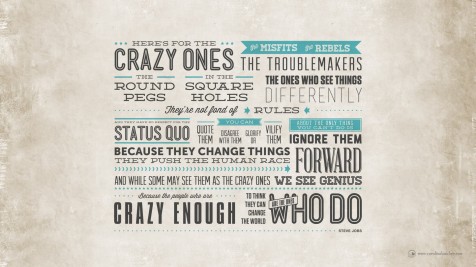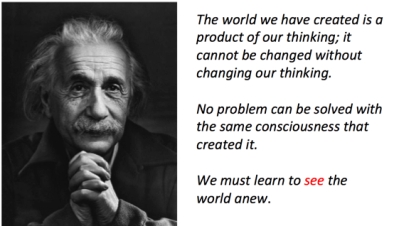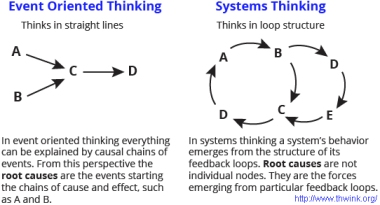On Wednesday of this week I set off for New York to join 150 people committed to figuring out how to make responsible tourism go mainstream at the Travel + Social Good 2016 Summit.
I’m encouraged because it won’t be a talkfest but a re-design workathon. I am particularly pumped up because I’ll be in the company of other Crazy Ones, like members of the Green Program, willing to listen as much as to speak and willing to look at the challenges facing us as both humans and as tourism professionals from many different perspectives.

I am also hopeful that before we rush into “the how,” we’ll acknowledge the critical importance of addressing two critical “why” questions:
- Why is the mainstream model of tourism – as a collective economic phenomenon practiced for the past 60 + years– becoming so unsustainable?
- What is the true purpose of a responsible, regenerative alternative?
But I am also a little fearful that out of a desire to be seen to be effective, fast moving, and action-oriented, we’ll confuse design with problem solving/fixing – as an exercise in re-engineering (albeit with a subtler, softer language) based on a belief we can stay in control of our future.
Even though our daily experience of global digital connectivity may have helped us (as both individuals and communities) to see ourselves as self organizing agents in a huge networked system of living systems, we still tend to apply industrial, mechanical tools to address today’s challenges.
For example, a persistent reductionist habit is evident in the way we segment responsible from sustainable, geo from eco, pro poor from community-based and continue to focus on issues as if they were disconnected from one another e.g., women’s rights, biodiversity, animal cruelty, human trafficking, carbon emissions, peace and security.
Answering the questions posed above (in italics) will necessitate our digging deep into root causes and both identifying and questioning the assumptions, values and beliefs that underpin and shape our behaviour.
While it has become fashionable to repeat the words in the graphic attributed to Albert Einstein, living that truth is very difficult. It requires a level of deep inner reflection and outer observation that very few time-pressed executives and leaders, who know they are judged on actions not thoughts, feel able to take.
When I repeatedly say, “tourism is not an industry but a living human system” most people nod their heads in agreement. Some tell me that they’ve studied systems theory and are familiar with its concepts. To which I say, “Great, but how do we live it?” Not only is that much harder to do but until we wear a systems set of lenses every day, we’ll fail to see how best to act.
Two words, which are appearing with increasing frequency in the business literature are purpose and regeneration, might trigger productive thought as to how live consciously within a system.
Purpose
At our best, humans are “meaning seeking beings.” Those of us whose survival needs have been met are asking deeper questions – Who am I? Why am I here? What’s my contribution to making the world a better place? Many of our customers are, in fact, travelling on a quest for answers. These are questions that apply to all aspects of our life, including economies.
People cogently asking the question “What’s an economy for? include Kate Raworth (Doughnut Economics) and Christian Felber, founder ofEconomy for the Common Good; along with the members of Conscious Capitalism; Business as an Agent for World Benefit; the Next System Project, the Business Alliance for Local Living Economies, and B-Corpcertified companies – to name merely a few of a growing host of individuals actively contributing to redesigning the economy.
Posing this question is crucial because as systems theorists and practitioners will tell us – you can’t direct a system, you can only disturb it. And the most effective way of disturbing a system is to change its purpose.
The late Donella Meadows – one of the most articulate and early proponents of a systems perspective has this to say in response to the question, if you can’t understand, predict, and control, what is there to do?
Systems thinking requires a different sort of “doing.” The future can’t be predicted but it can be envisioned and brought lovingly into being. Systems can’t be controlled but they can be redesigned. We can’t surge forward with certainty into a world of no surprises, but we can expect surprises and learn from them and even profit form them. We can’t impose our will upon a system, we can listen to what the system tells us, and discover how its properties and our values can work together to bring forth something much better than could ever be produced by our will alone. We can’t control systems but we can dance with them!
Hopefully at the Summit, we’ll start with an inquiry into the purpose of tourism and hospitality. Readers of my blog will know it’s one of my favourite questions and most popular topics ( seeWhy should these graduates work for you?)
- Is tourism simply about maximizing shareholder profit or enabling all its stakeholders to flourish?
- Is the purpose of a destination and the agencies responsible for it simply to attract more visitors (to grow in volume) or to ensure this activity generates greater net benefit(measured both quantitatively and qualitatively) for all stakeholders?
- What – especially from a systems point of view – does a successful, flourishing destination look and feel like?
- Can tourism fulfill a higher purpose and genuinely contribute to making the world a better place and how?
Regenerative
Which leads me to the next word grabbing more business attention: Regenerative.
Another great contemporary writer thinker, Marjorie Kelley, having conducted a through analysis of which financial institutions continued to serve their communities through a period of financial collapse observed in her book Owning Our Future:
You don’t start with the corporation and ask how to redesign it.
You start with life, with human life of the planet and ask…
How do we generate the conditions for life’s flourishing?
To which I would answer, you can’t do that without changing your mindset and shifting your focus away from mechanics and engineering to living systems and evolution. I am in agreement with another economist turned philosopher-change agent, David Korten whose plain speaking in Change the Story: Change the Future drives the point home:
The only valid purpose of an economy is to serve life. To align the human economy with this purpose, we must learn to live as nature lives, organises as nature organises, and learn as nature learns, guided by a reality-based, life centred, intellectually-sound economics.
It’s because life evolves and is not static that we can never restore something to its original condition nor can we ever succeed in conserving what we have today for future generations. (I was in magical mystical Bali in 1973 – there’s no way a visitors can have that experience today). But what we can do is restore a system’s capacity to continuously self organize and evolve into ever higher levels of complexity, beauty, order, resilience and adaptability.
It’s because of this more accurate understanding of LIFE, that the word sustainability has not succeeded in capturing the hearts and minds of the majority.
In A Living Systems Approach to Design, Bill Reed, cofounder of Regenesis starts his presentation with:
Regeneration is about framing restoration as a whole – engaging the earth’s systems, the biotic systems, AND the people of each unique place in a continuous dialogue of restoration and evolutionary development – a healing or “wholeing.”
Regeneration involves inspiration – an act of breathing new life into a person, into an enterprise, a community, a place, an association and a guest!
Finally and this is the point most pertinent to tourism – we can do regeneration best at a community level because first and foremost it involves expressing and celebrating the forms of life that reflect the uniqueness of the place in which life evolves. As we grow in awareness of who we are and why we are here as humans, we are literally re-membering (piecing back together) the whole system of life in each unique place instead of the fragments we have been taught to specialize in. Indigenous people, allowed to live on the land true to the customs and traditions that emerged from it, have never forgotten this living systems knowledge. Our indigenous brothers and systems can help all of us become indigenous again and learn to be living expressions of a place we in tourism call a destination.
Finally to inspire and encourage let me a share a great example presented by the efforts of residents on Inishboffin to ensure their visitor economy flourishes through responsible, community-driven tourism development. My dear friend Mary Mulvey of Eco Tourism Ireland who inspired and supported the community and, in my opinion, did an amazing job. It’s one example of thousands emerging from the grassroots.
So for all these reasons, I am very excited and inspired by the prospect such great company at the end of this week and exploring how tourism fulfil its true potential as a force for good.
This is a article was first published by Anna Pollock on the Conscious Travel website. Read the original article here: Travel + Social Good: It All Starts with WHY? | Conscious.Travel





